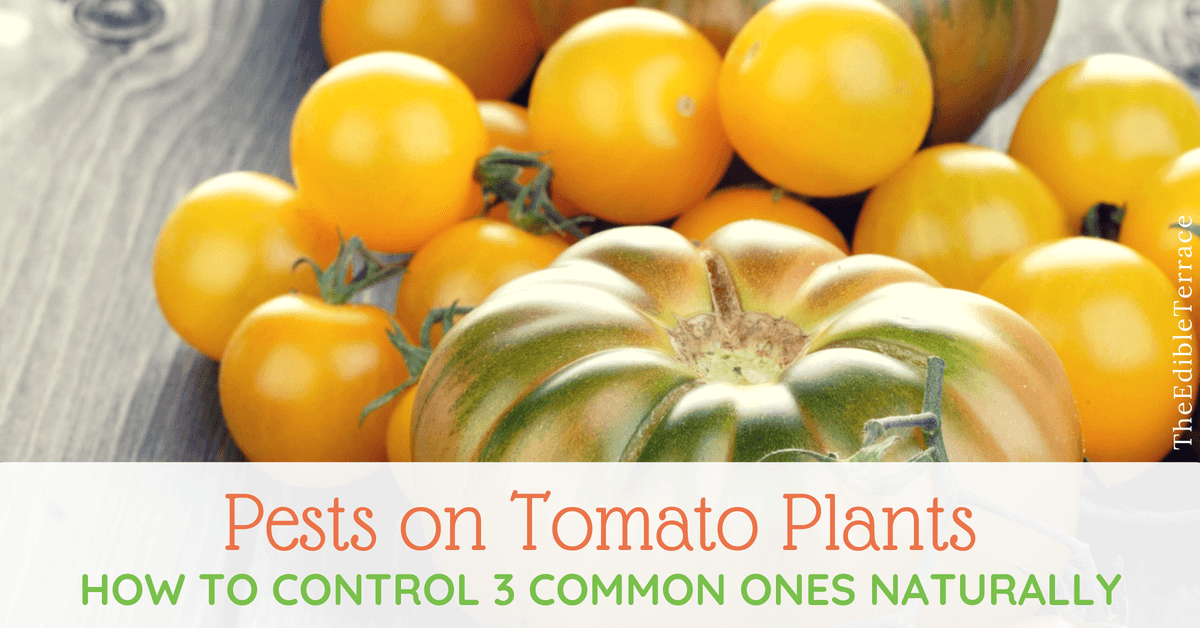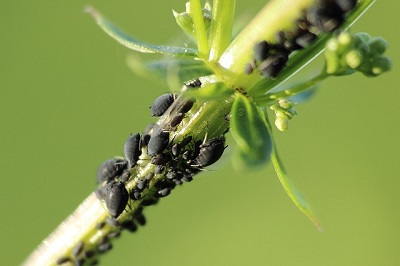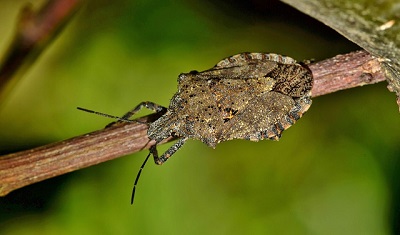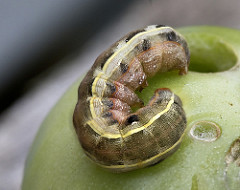Hey! By the way… TheEdibleTerrace is reader-supported. When you buy through links on our site, we may earn an affiliate commission and as an Amazon affiliate, we earn from qualifying purchases. Thanks in advance for your support!

As a tomato gardener, you will no doubt encounter a whole host of common garden pests. Creepy critters like cutworms, flea beetles, grasshoppers, spider mites, and root weevils are all too eager to feast on your beautiful, healthy plants.
Three of the most common [easyazon_link identifier=”B000UJUVR8″ locale=”US” tag=”edibleterrace-20″]pests on tomato plants[/easyazon_link] you’ll want to guard against are aphids, stink bugs and tomato fruit worms. The damage these little buggers cause is varied, so it pays to know exactly what you are up against with each. So, let’s look at each one and discuss some organic solutions to get rid of them.
Pests on Tomato Plants
Aphids

These tiny green or black insects can either be winged or wingless and like to hang out in clusters on the bottom side of tomato leaves or tomato stems. They suck moisture and nutrients out of your tomatoes, causing curled and yellowed leaves and stunted plants.
Stink Bugs

True to their name, stink bugs let off a very foul odor if threatened or squashed. Both nymphs and adults damage your tomatoes by sucking their sap and attacking the fruit. Young and adult stink bugs look the same with an easily recognized shield-shaped body. Adults can be black, brown or green, and either with or without markings.
Youths are basically just smaller versions of adult stink bugs. When they attack your tomatoes, your plants are weakened and young fruit may form improperly as a result. Yellow-white spots beneath the skin of ripened fruit are a common sign of stink bug damage to your crops.
Tomato Fruit Worms

Source: https://flic.kr/p/VMAK2A
Also known as the corn earworm, these pink, green or brown insects with light striping can grow to nearly 2 inches long. They are actually moth larvae that bore into tomato fruit to feed. Moths lay their eggs close to tomato stems with green fruit, and approximately one week later, you will have a tomato fruit worm problem.
How To Get Rid of Bugs on Tomato Plants Naturally
[easyazon_infoblock align=”right” identifier=”B078HYV15D” locale=”US” tag=”edibleterrace-20″]Once you see any of these common and frustrating tomato pests on your plants, you’ll want to take immediate action. For starters, spray the affected areas with a strong stream of water to dislodge these critters. If you spray several days consecutively, you can eliminate multiple generations of these quickly multiplying pests. Once you’ve done that, you’ll also want to employ any of the following organic pest control methods:
- Hand picking – throw on a pair of gardening gloves and fill a large can with warm, soapy water. Then simply pluck the little “darlings” off your plants and drop them into the can.
- Weeding – if you have planted your tomatoes directly into the ground, keep the areas around your plants free from weeds and other garden debris as this eliminates a favorite habitat and hiding place for many garden pests.
- [easyazon_link identifier=”B000UJUVR8″ locale=”US” tag=”edibleterrace-20″]Organic insecticidal soap[/easyazon_link] – mix the soap with water to create a 2 to 3% solution and apply directly to common tomato pests for best results.
- [easyazon_link identifier=”B00FY4YWB0″ locale=”US” tag=”edibleterrace-20″]Neem oil[/easyazon_link] – this organic, plant-based oil is very effective against aphids, stink bugs and tomato fruit worms. You can find it in many garden centers or order it online. Apply according to package directions for best results.
- Beneficial insects – introduce beneficial insects, such as [easyazon_link identifier=”B00533KOIC” locale=”US” tag=”edibleterrace-20″]ladybugs[/easyazon_link], praying mantis, and lacewings (all available for order online) to your garden and let them do what they do best.
Conclusion
Garden pests on tomato plants are an inevitable fact of life for gardeners. However, with a little education and the right resources, you’ll be able to protect your hard work so you can relax and enjoy the fruits of your labors!

